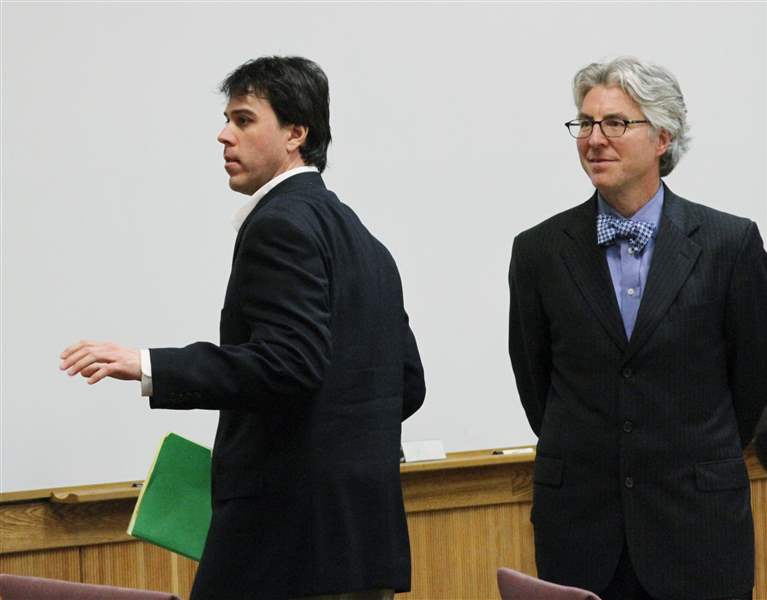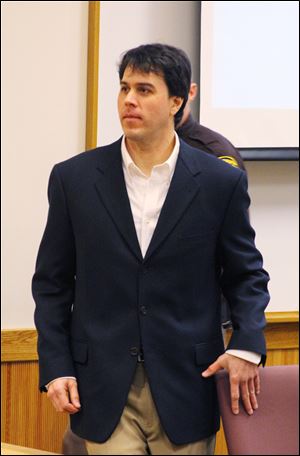
Mich. freeway shootings suspect: Wanted to send a message
1/27/2014
This Jan. 16, 2014 photo, I-96 shooting suspect Raulie Wayne Casteel looks to his family with defense attorney Charles Groh next to him as he exits the courtroom in Howell, Mich. Casteel is expected to testify in his own defense on Monday, Jan. 27, 2014. Casteel is contesting terrorism and assault charges in connection with the two dozen shootings in October 2012. Police say they matched his gun to bullet fragments recovered from victims' vehicles in four counties. (AP Photo/Livingston County Daily Press & Argus, Lisa Roose-Church)
ASSOCIATED PRESS

I-96 shooting suspect Raulie Wayne Casteel looks toward his family as he re-enters the courtroom in Howell, Mich on Jan. 16.
HOWELL, Mich. — A man charged with firing a gun at vehicles along the Interstate 96 corridor in Michigan did so because he believed motorists were part of a government conspiracy against him, he testified at his state terrorism trial today.
Raulie Casteel, during more than two hours on the stand in the morning, told jurors he was filled with fear and anxiety while in traffic, most likely from undiagnosed delusional and paranoid thinking.
During questioning from his lawyer, Charles Groh, the 44-year-old defendant conceded that he fired at cars in October 2010, but that he “absolutely” did not intend to hurt or terrorize any of the drivers.
“I saw a long line of traffic, felt fear and anxiety and shot,” Casteel, 44, said, describing one of the shootings that took place in four counties.
He said he kept a handgun on the floorboard near his right leg. In one instance, Casteel testified that a woman who had been tailgating him then passed his car on the right agitated him to the point that he picked up the gun, rolled down the passenger side window and fired at the woman’s car.
Under questioning from assistant attorney general Gregory Townsend, Casteel said he never thought about the ramifications of the shootings, only that he wanted “to send a message to back off.”
Casteel acknowledged that he had seen media reports about the shootings and knew that he “might get a knock on my door someday.”
“I knew people were scared,” he said.
Casteel is contesting terrorism and assault charges, but not firearms charges, in connection with the two-dozen shootings in October 2012. Police say they matched his gun to bullet fragments recovered from victims’ vehicles.
Casteel is a Michigan State University-educated geologist and soil scientist with experience in environmental cleanup. He’s a Michigan native who lived in Taylorsville, Ky., before returning to his home state in 2012.
He testified that after losing his job, he started to believe that the government was monitoring his phone calls and sending helicopters and other low-flying aircraft buzzing over his home in Kentucky.
“Sounds kind of paranoid,” Groh said to him.
“It was, yes,” responded Casteel, who also said he believed at the time that “advanced technologies” used by the government may have played a part in his wife’s miscarriage and illnesses suffered by his infant daughter and the family’s two cats.
There is a history of mental illness on his mother’s side of the family, Casteel testified. He said he has received mental health counseling since being jailed and is taking medication.
Cross-examination by the prosecution is to continue after a lunch break in Livingston County Circuit Court in Howell.
Last year, Casteel pleaded no contest but mentally ill to assault and firearms charges in Oakland County in connection to related shootings that took place there. He faces up to 12 years in prison when he is sentenced Thursday. A no contest plea isn’t an admission of guilt but is treated as such for sentencing purposes. The mental illness allows him to get treatment in prison.